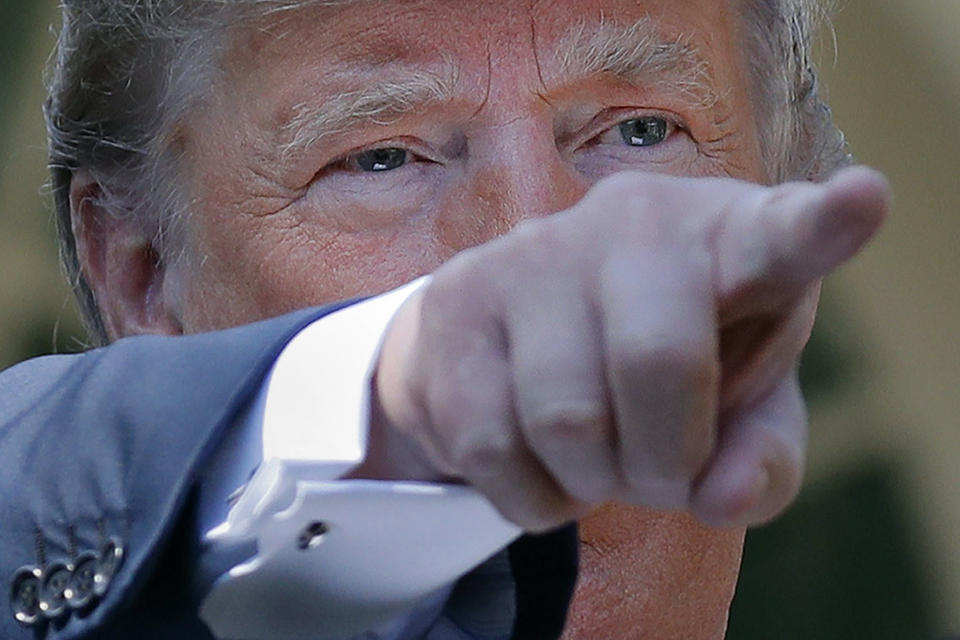Here’s who Trump will blame when stocks tumble

President Trump is a master at blame-ducking. And he has recently telegraphed who he plans to hold responsible whenever there’s a meaningful drop in the stock market.
Trump has become a vocal critic of the Federal Reserve, complaining that the central bank is raising interest rates too far, too fast. He recently griped that the Fed is “going wild,” even though most economists support the Fed’s strategy of gradually pushing interest rates back toward historical averages.
Fed policy may, in fact, be contributing to jittery markets. The S&P 500 is up 2% for the year, but down 3.4% so far in October, with the modest selloff caused in part by rising rates that make bonds a more attractive alternative to stocks. But most investors and economists think the economy can handle higher rates, and besides — the Fed can change its policy if the economy turns out weaker than expected.
Trump is also teeing up another scapegoat should markets slide — Democrats. The odds seem to be in favor of Democrats taking control of the House of Representatives in the midterm elections, with an outside shot at control of the Senate. Trump already blames the Democrats for illegal immigration, crime and other plagues, and he has warned that “the best economy in the history of our country would totally collapse” if Democrats were in charge.
It’s not hard to see how this might play out. If Republicans retain control of Congress, they plan to pass another round of tax cuts and continue with the stimulative, deregulatory agenda they’ve pursued during the last two years. Democrats, on the other hand, want to roll back tax cuts for the wealthy and for some businesses. They won’t be able to do that with Trump in the White House, vetoing bills he doesn’t like. But Democrats could block Republican legislation with control of just one house of Congress, essentially putting an end to the business-friendly legislation.
The current bull market is more than nine years old and could peter out in late 2018 or 2019, or even enter a bear-market correction of 20% or more. That would be pretty normal late in the business cycle, and might even take some froth out of stocks. But Trump follows the market closely and has claimed credit many times for gains during his tenure. A sharp sell-off would surely get his attention and prompt the kind of finger-pointing we’ve all become familiar with.
Trump is a strategic blamer, sometimes setting up his target well in advance of bad news, to condition onlookers to the villainy of those he wants to tarnish. Trump has clearly done so with the Robert Mueller, the special counsel investigating Russian interference in the 2016 U.S. elections. Mueller has said virtually nothing publicly in nearly a year and a half of work, while notching several important convictions and indicting a number of foreign operatives who targeted the nation’s electoral system. Yet Trump routinely derides the Mueller probe as a “witch hunt,” no doubt preparing for the day Mueller may unveil information damaging to Trump.
In the same way, Trump is constructing the Fed as his bogeyman on the economy, with “obstructionist,” “mob-rule” Democrats as convenient accomplices. The trouble is, by deflecting blame in an economic swoon, Trump could unwittingly undermine confidence himself, making a downturn worse. And if the president can’t help when the economy turns south, then he must not have been responsible when things were going well.
None of this is a problem for Trump now, with growth strong, unemployment low and investors upbeat. But markets can deteriorate fast, and blame from the top will not reassure anybody. Watch where those presidential fingers are pointing.
Confidential tip line: rickjnewman@yahoo.com. Click here to get Rick’s stories by email.
Read more:
Rick Newman is the author of four books, including “Rebounders: How Winners Pivot from Setback to Success.” Follow him on Twitter: @rickjnewman


